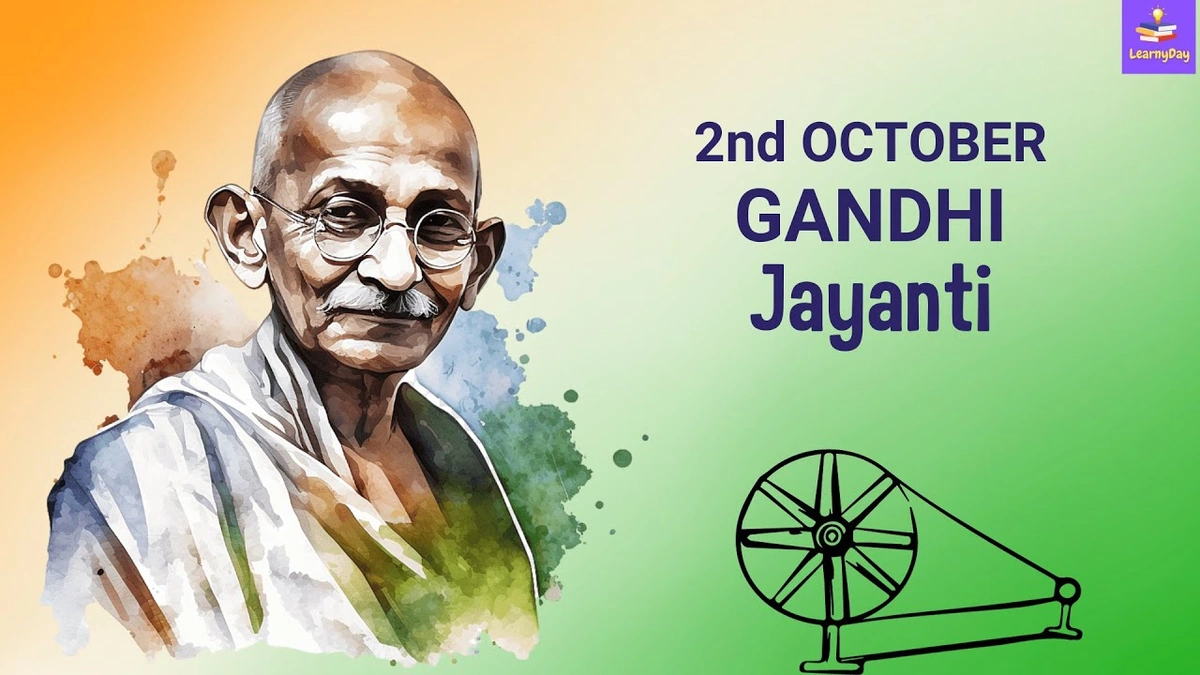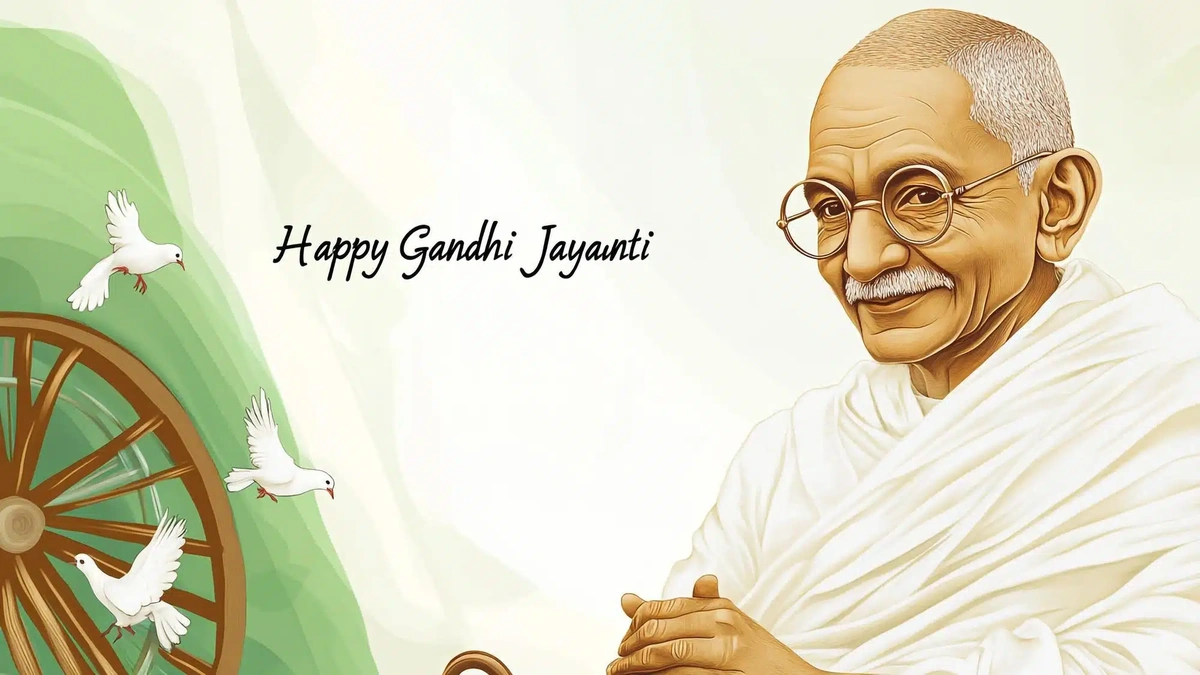2 October Gandhi Jayanti | More Than Just a Holiday – Why It Still Matters
2 October. Gandhi Jayanti . We all know the drill: a national holiday, maybe a school play, and a general sense of…something. But let’s be honest, how often do we really think about what this day signifies beyond the surface? What fascinates me is that, in a rapidly changing India, the principles espoused by Mahatma Gandhi simplicity, non-violence, and self-reliance feel more relevant than ever, even if they seem a little…old-fashioned.
So, this Gandhi Jayanti , let’s ditch the routine and dive deeper. Why does this day still resonate? What can we, as Indians in 2024, learn from Gandhi’s life and teachings? It’s not just about remembering a historical figure; it’s about understanding the enduring power of his ideas.
The Enduring Relevance of Gandhian Principles

It’s easy to dismiss Gandhi’s philosophy as idealistic or impractical in today’s world. We are a nation of high speed internet and a billion smartphones. But consider this: In a world grappling with climate change, consumerism, and social inequality, Gandhi’s emphasis on sustainable living, ethical consumption, and social justice rings incredibly true.
Think about it: His advocacy for swadeshi (self-sufficiency) isn’t just about buying local; it’s about supporting local economies and reducing our dependence on global supply chains – something that’s become increasingly important post-pandemic. And his commitment to non-violent resistance offers a powerful alternative to the divisive rhetoric that often dominates our public discourse. Gandhi’s approach to Satyagraha encouraged dialogue and negotiation, emphasizing that even the most stubborn conflicts could be resolved through peaceful means.
Gandhi’s Impact on Modern India
Gandhi’s influence extends far beyond the realm of politics. His ideas have shaped movements for social change, environmental protection, and economic justice across India and the world. The concept of ‘Sarvodaya’, meaning ‘upliftment of all’, which he championed, continues to inspire initiatives aimed at empowering marginalized communities and promoting inclusive development.
Moreover, his emphasis on education and self-improvement laid the foundation for a more enlightened and empowered citizenry. A common mistake I see people make is viewing Gandhi as solely a political leader; he was also a social reformer, an educator, and a champion of human rights. 2 October should really be used to refresh his ideas.
The Challenge of Upholding Gandhian Values Today
Let’s be honest, upholding Gandhian values in today’s fast-paced, materialistic world isn’t easy. We are constantly bombarded with messages that encourage us to consume more, compete fiercely, and prioritize individual success over collective well-being. So, how do we reconcile these conflicting pressures? That’s the million dollar question, isn’t it?
Well, it starts with awareness. Recognizing the subtle ways in which consumerism and competition shape our thoughts and actions. It also requires a conscious effort to cultivate values like compassion, empathy, and selflessness. This might involve making small changes in our daily lives, such as reducing our consumption, supporting local businesses, or volunteering in our communities. Every little bit counts. But it also means holding our leaders accountable and advocating for policies that promote social justice and environmental sustainability.
Gandhi Jayanti Celebrations | More Than Just Ceremonies
The official Gandhi Jayanti celebrations usually include prayer services, tributes, and cultural events. However, the true spirit of the day lies in internalizing Gandhi’s message and putting his principles into practice. Many organizations and individuals organize various activities on this day, such as cleanliness drives, tree plantation, and awareness campaigns on social issues. These initiatives aim to promote Gandhi’s vision of a clean, green, and equitable India. But, let’s be real, we need to move past symbolic gestures and address the root causes of the problems we face. 1 October is a reminder that a day of reflection is good.
For example, instead of just cleaning the streets on 2 October, we should focus on creating sustainable waste management systems that prevent pollution in the first place. Instead of simply planting trees, we should work to protect our existing forests and promote biodiversity. And instead of just talking about social justice, we should advocate for policies that address systemic inequalities and empower marginalized communities. What fascinates me is that we can easily use this day to become more progressive.
Re-interpreting Gandhi for a New Generation
Perhaps the biggest challenge is making Gandhi’s teachings relevant to a new generation of Indians who have grown up in a vastly different world than the one he inhabited. But that doesn’t mean his ideas are outdated; it just means we need to find new ways to communicate them. We need to find a bridge.
One way to do this is by highlighting the connections between Gandhi’s philosophy and contemporary issues, such as climate change, social media, and mental health. For example, we can explore how his emphasis on simple living can help us reduce our carbon footprint and live more sustainably. We can examine how his teachings on non-violence can help us navigate the complexities of online communication and promote respectful dialogue. And we can investigate how his focus on self-reliance can help us build resilience and cope with the stresses of modern life. This is the magic of Mahatma Gandhi .
FAQ Section
Frequently Asked Questions
What exactly is Gandhi Jayanti?
It’s the celebration of the birth anniversary of Mahatma Gandhi, observed annually on 2 October. It’s a national holiday in India.
Why is Gandhi considered the ‘Father of the Nation’?
Because of his pivotal role in India’s independence movement and his philosophy of non-violent resistance.
How can I celebrate Gandhi Jayanti meaningfully?
By reflecting on Gandhi’s teachings and putting them into practice in your daily life. Think about simple acts of kindness, promoting peace, or supporting local artisans.
What is the significance of ‘Satyagraha’?
It’s Gandhi’s philosophy of non-violent resistance, emphasizing truth and love as the means to achieve social and political change.
Where can I learn more about Gandhi’s life and teachings?
Visit the Gandhi Heritage Portal .
Gandhi Jayanti isn’t just a date on the calendar. It is a day to celebrate his principles and ideals and their potential for a better world. By thinking about Gandhian philosophy this 2 October, we can create a nation that is socially just and more compassionate. Also note the weather could impact celebrations. It’s about recognizing his struggles and implementing them in a practical manner.













